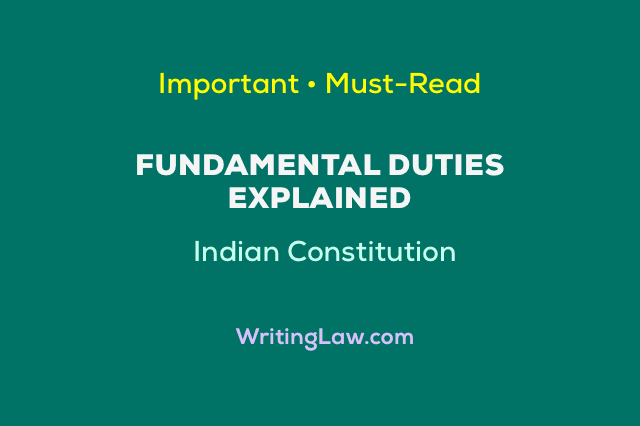
It is said that a person’s right is another person duty and vice-versa. At the beginning of enforcement of the Indian Constitution, fundamental duties were not a part of it. They were later added in the year 1976.
It is observed that, generally, the duties are neglected by the individuals. To make every citizen realise his duty, the amendment of 1976 added fundamental duties in the Constitution. We have borrowed this concept of fundamental duties from the Constitution of the USSR.
Swaran Singh Mehta Committee Recommendations
In 1976, a committee was set up named Swaran Singh Mehta Committee to give recommendations on fundamental duties. It is the period when an internal emergency was imposed in India. The committee recommendations were as follows:
- To add a separate part in the Constitution on fundamental duties.
- The committee emphasised that citizens must be made aware of their duties along with their rights.
- The committee suggested for eight fundamental duties. But the Parliament incorporated ten fundamental duties in Part IVA, by 42nd amendment, 1976.
Certain recommendations of the committee were rejected and not accepted by the government, like to impose a penalty for not obeying duty, to pay tax to the government should also be a duty, and any penalty shall not be questioned in any court.
Fundamental Duties
Article 51A of the Constitution lays down the fundamental duties of the citizens of India. They are:
- To give respect to constitutional ideals and institutions, our national flag and the anthem.
- To follow those ideals and principles, which inspired our national struggle for freedom.
- To protect the sovereignty, unity, and integrity of India.
- To defend the country in every situation and serve the nation when called upon to do so.
- To spread “we feeling” among all people, to promote harmony among all, not giving importance to differences but believing in unity in diversity.
- To preserve and conserve the rich heritage culture of our nation.
- To protect our natural environment, rivers, wildlife, forest, lakes.
- To develop a scientific temper in oneself and a curiosity to inquire and reform.
- To protect public property and prevent violence.
- To put maximum efforts into striving excellence in all fields and spheres so that nation reaches a higher level.
- To provide opportunities to children of age group 6 to 14 years for education. (This duty was not added after Swaran Singh Committee recommendations but by 86th amendment, 2002).
What Was the Need for Fundamental Duties
Fundamental duties are significant and hold an important place in our Indian Constitution. It is said that where there is a right, there is a duty also. One cannot abstain himself or herself from his or her duties towards the nation. Duties are an intrinsic part of every citizen of a nation. Rights and duties are inseparable.
- The duties serve as a reminder to the citizens that, along with enjoying rights, they have to perform their duties as well.
- It clearly indicates that no anti-national activity shall be forgiven. Duties expressly remind citizens to defend the nation and protect its sovereignty and integrity.
- Duties make every citizen a responsible citizen of the nation. It makes citizens active members of a nation.
- It helps to strengthen democracy and achieve the correct balance between the rights and duties of citizens.
Verma Committee Report
The Verma Committee report on fundamental duties observed that some fundamental duties could be well implemented through the existing legal principles. Like:
- There is an act called Prevention of Insults to National Honour Act, 1971. It prevents every citizen from disrespecting the national flag, symbols, and anthem.
- Various provisions in criminal law deal with offences where enmity is encouraged and promoted between different sections of society.
- The Protection of Civil Rights Act, 1955, provides punishment for offences directly related to a person’s caste and religion.
- There is an Unlawful Activities Prevention Act, 1967, which declares a communal organisation as an unlawful association.
Likewise, there may be many provisions and existing legal principles in IPC or Criminal Law that can be useful to enforce fundamental duties. Duties are not directly justifiable, but many statutes indicate provisions similar to the duties. It is, therefore, the responsibility of every Indian to follow all fundamental duties.
Read Next:
1. Is the Right to Die a Fundamental Right?
2. 6 Fundamental Rights Under the Constitution of India
3. Why 42nd Amendment Is Called the “Mini Constitution of India”
- 18 Most Important Amendments to the Indian Constitution - 12th August 2023
- 8 Kinds and Theories of Punishment - 22nd July 2023
- What Is the Meaning of Res Judicata in Civil Procedure Code? - 22nd January 2023







